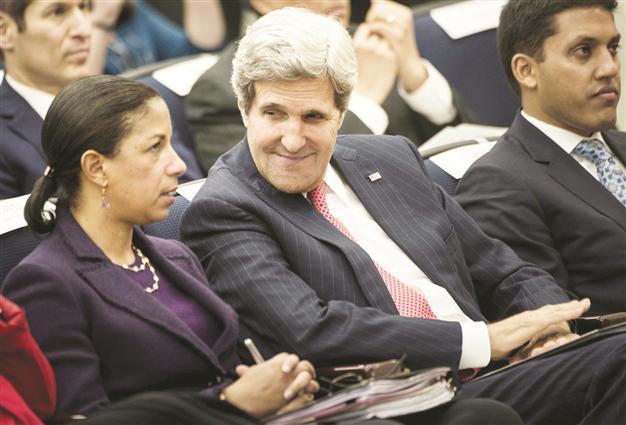US may reimpose sanctions if Iran does not comply: Rice
HONOLULU

National Security Advisor Susan Rice (L) speaks with Secretary of State John Kerry during an event at the White House. Rice said Iran may face reinstated sanctions if it fails to keep up with the deal. AFP photo
The United States and its allies will have ways to reimpose sanctions on Iran if the Islamic Republic is caught making bombs after striking a deal to freeze its nuclear program, national security adviser Susan Rice said Dec. 22.In an interview on the CBS news program “60 Minutes,” Rice rejected the idea that, once relaxed, the economic sanctions on Tehran would be hard to reinstate, according to Reuters.
Any United Nations Security Council resolution that enshrines a final nuclear deal with Iran - not the interim six-month deal signed in Geneva in November - could have triggers to automatically reimpose sanctions on Iran if they violate the deal, she said.
“We will not construct a deal or accept a deal in which we cannot verify exactly what they are doing,” Rice said. “And if they’re caught, we will ensure that the pressure is reimposed on them.”
A mechanism for such “automatic triggers” has not been finalized, Rice said. Any deal beyond the current arrangement is still months away.
“We haven’t designed that resolution yet. But this is something that’s quite doable,” Rice said. The United States does not want Iran to be “in a position to race towards a bomb undetected.”
Rice said it was still unclear if Iran was hurting enough from existing sanctions on its oil exports and other industries to give up its nuclear ambitions in a “verifiable way.”
“We don’t know. But the other half of the answer is we have every interest in testing that proposition,” she said.
Under November’s interim agreement, Iran agreed to curb its nuclear program for six months in exchange for limited relief from sanctions. The Obama administration has clashed with Congress over the sanctions issue; many lawmakers want to impose tougher sanctions on Iran.
Nuke talks suspended for Christmas
Meanwhile, Iran’s foreign minister and the EU’s top diplomat agreed during telephone call on Dec. 22 to postpone talks on implementing the agreement until after Christmas, the country’s chief negotiator said.
“During this telephone conversation, it was agreed to continue the negotiations, but with the Christmas holidays in sight it was decided to interrupt and resume (the talks) a week after the holidays,” said Abbas Araqchi.
The Iranian nuclear negotiator said the agreement was reached during a call that lasted “45 minutes” between Iranian Foreign Minister Mohammad Javad Zarif and EU foreign policy chief Catherine Ashton, according to Agence France- Presse.
Araqchi, who is also deputy foreign minister, said the discussions were progressing slowly because of “interpretations” of points of the agreement.
The negotiations, which are aimed at setting a framework and a timeline for the nuclear accord, stretched into a fourth day in Geneva on Dec. 22.
Zarif said little progress had been made in the talks with the P5+1, U.N. Security Council permanent members Britain, China, France, Russia and the United States plus Germany.
“The talks on implementing the accord are not easy. They are progressing, but slowly,” he told a joint news conference on Dec. 22 with visiting Italian Foreign Minister Emma Bonino.
“I hope all sides will avoid delving into issues that could become troublesome and complicate the process,” Zarif added without elaborating.
Earlier this month, a round of talks in Vienna was suspended after the United States blacklisted 19 Iranian companies and people, and some Iranian officials said this decision violated the spirit of the Nov. 24 nuclear agreement.
Iran rejects Western fears that its nuclear work has any military intentions and says it needs nuclear power for electricity generation and medical research.
















